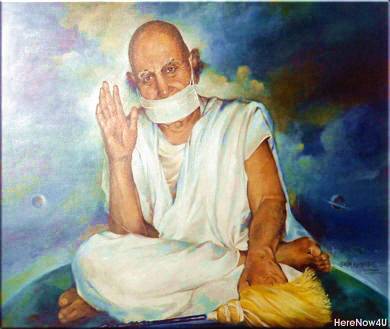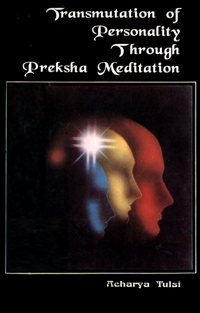
Conditions change! No more sane living in a Gurukul!
Shivirs now partly serve to make good what is gone.
The system grows; all kinds of shivirs,
With different aims are held, on different grounds.
Jain Vishva Bharati, the harbinger of awakening,
Promotes sadhana-shivirs, when and wherever possible;
Ten-day shivirs, or 7-day; peaceful meditation!
Campus repose, free from all commotion!
The gurukul tradition is now extinct. But need is felt, even today, for the kind of personality, that was evolved there. Do we have any substitute to make up for the lost tradition?
The system of gurukul is gone. It is not acceptable to modern sensibilities. Freedom today has found a new definition. All ancient standards of discipline stand altered. The prestige enjoyed by the guru and discipline in olden times is fast dwindling. The idea of practising sadhana in a gurukul for years together now seems impossible. Because, a gurukul has its own traditions, which the residents must observe wholeheartedly. If the tradition is not so observed, it becomes a burden. In the atmosphere prevailing today, the utility of the gurukul institution has become questionable. But an alternative to the gurukul tradition exists - which is shivir-sadhana.
Indeed, shivir system is the new method of this age. It may be said to partly make up for the gurukul system. Nowadays, a great many shivirs are organised where experiments are being conducted in various fields, such as education, sadhana, therapy and recreation. Of course, a shivir in any particular field is conducted on its own ground. Every shivir has a different objective. Naturally, the results are also different. Nevertheless, the practice of holding shivirs has met with a fair measure of success.
The Jain Vishva Bharati is a unique institution. Experiments are being held there in three different disciplines: Education, Sadhana and Service. In order to systematise this experimentation, the Jain Vishva Bharati organizes shivirs from time to time. The Sadhana Centre of Jain Vishva Bharati (Tulsi Adhyatma Needam) is fully able to this task. The workers of the Needam are responsible for making all arrangements. They want that everyone should drink deep of the fountain of spirituality established here. That an individual should go thirsty in the absence of water sounds natural. But that a man should groan with thirst while living in the vicinity of a vast reservoir of water is not so intelligible. In this context, Kabir says:
The fish living in the water athirst!
It tickles me to laughter!!
The poet, who cannot help laughing at the prospect of a fish tormented by thirst in the midst of water, later writes. "All this happens for want of self knowledge."
All man's confusion, all his contrariety is possible only in a state of self-aversion.
The individual whose gaze is turned inwards, changes his character through the practice of preksha dhyana, and is able to transform his personality.
Incidents of change of character or personality transformation often occur in the lives of sadhaks participating in a shivir. Many people achieve freedom from addiction by practising meditation there.Sometimes, a man accepts evils like drinking and smoking, so as not be out of fashion. Later, he gets so caught in the habit, that he cannot get out of it, even if he desires to do so. The participants of preksha dhyana shivirs, through inner inspiration and the impact of environment, make possible what appears to be impossible. They are able to dissolve their tensions and acquire the technique of living peacefully. Until the state of introversion is strengthened through meditation, a change of character cannot take place. There is thus constant need for training and practice in the meditation camps.
What is the fundamental objective of preksha dhyana? In what direction and to what extent can a sadhak practising preksha dhyana progress?
The chief objective of preksha dhyana, is to make religion a way of life. Religion today appears to be impotent, the reason being the complete absence of its practice in the lives of religious people. Without practice, religion cannot influence life. In order to introduce religion in life, the practice of meditation is a must. If has been said in Isibhasium Sutra, that religion without meditation is like a body without the head. Meditation is the practical form of religion. It is in the practice of meditation that religion is activated in life. Until one enters meditation in depth, the secrets of religion are not revealed. Religion in itself is a mystery, which remains incomprehensible to a superficial observer.
Once the disciples of Guru Gobind Singh assembled before him in a group. While acquainting him with their problem, they said,
"Everyday we sing in praise of the Lord, but it has brought us no enlightenment. We have practised sadhana for years together, but to no purpose."
Guru Gobind Singhji said, "I understand your problem. We shall look into it."A few days later, he called all the disciples and said,
"Fetch me a pitcher full of wine and gargle your mouths with it, without letting go a single drop down the throat. Do it till the pitcher is emptied." T
he disciples fetched a big pitcher of wine. They took mouthfuls of wine and instantly spat it out. Within no time, the pitcher got emptied. Guruji said,
"Did you finish the whole lot?"
And when they replied in the affirmative, he said,
"It was a lot of wine. Didn't you get intoxicated?"
The pupils looked at their guru in surprise. They humbly said,
"Gurudev! We never let a drop go down our throats. So how could we get intoxicated?"Guruji, taking up their words, said,
"0h pupils, here is the answer to your problem. You have sung in praise of the Lord, but only superficially. The name of the Lord never got deep down your throat! How could you be benefited? Until your whole mind is identified with the name of the deity, until you repeat it with all your heart, until you become rapt iterating it, no benefit would accrue to you."In the context of this story, it becomes apparent that unless one descends into the depths of religion, all religious worship proves futile. Sadhana is a fruitful method of exploring the depths of religion. After undergoing this process of exploration, all doubts stand resolved of themselves. The question about the utility of religion for the present age does not then arise at all.
 Acharya Tulsi
Acharya Tulsi
